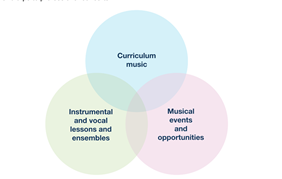School Music Development Plan & Self-Evaluation Audit
The refreshed National Plan for Music (NPME) was published jointly by the DfE and DCMS. The plan outlines how music should be delivered in ALL schools. The vision of the new plan is;
To enable all children and young people to learn to sing, play an instrument and create music together, and have the opportunity to progress their musical interests, including professionally.
This means all children and young people:
- experience a broad musical culture in schools and education settings, accessing high quality curricular and co-curricular music, and progressing into appropriate qualifications
- access the expertise, instruments, technology and facilities they need to learn, create and share their music
- engage with a range of enrichment opportunities to play and sing, to perform, create and experience live music, and have their music heard
- have opportunities to progress their musical interests and talents, and routes into a variety of music careers
- are supported by a skilled and dynamic workforce

A high-quality school music education consists of three distinct, but interlinked areas of provision:
- Curriculum music, compulsory from key stages 1-3, then optional for examination classes (e.g. GCSE, vocational and technical qualifications and A level).
- Instrumental and vocal lessons, and ensemble membership.
- Musical events and opportunities, such as singing in assembly, concerts and shows, and trips to professional concerts
School Music Development Plan
The NPME recommends that all schools have a Music Development Plan in place, that sets out how the school will deliver high-quality music provision for all pupils. The NPME identifies the key features of high-quality school music provision as:
- timetabled curriculum music of at least one hour per week for Key Stages 1 to 2
- access to lessons across a range of instruments and voice
- a school choir and/or vocal ensemble
- a school ensemble/band/group
- spaces for rehearsals and individual practice
- termly school performances
- opportunities to enjoy live performances at least once a year
In addition to the key features set out above, the following points are also mentioned in the NPME:
- Schools should ensure that music lessons are delivered by a designated music lead and ideally a music specialist.
- Ensure that singing is a core element in the provision with daily singing and singing assemblies considered.
- Adopt a curriculum that is at least as ambitious the Model Music Curriculum.
- Work in partnership with the local music hub and other providers.
- Highlight the progression opportunities for children to access ensembles in the wider community provided by the music hub and their partners
As a condition of our DfE Music Hub grant, we are required to ask schools annually for information about their music provision and engagement with the DfE expectations for music. To support this we have created a short online self-evaluation audit, which will auto-populate a draft School Music Development Plan. This will help schools to:
- Benchmark their school against DfE expectations;
- Understand what excellent music provision looks like;
- Engage critically with their music offer and decide on future actions for their school;
- Identify support available from Wandsworth Music;
- Create a record for passing on to a new music lead;
- Complete the data for the annual DfE survey;
- Provide evidence for an Arts and Culture endorsement, Ofsted Deep Dive and Artsmark.
Complete the Music Self-Evaluation Audit and receive FREE music mark membership (worth c.£100)!
How to complete the form
We have taken the key features of a high-quality school music curriculum (as outlined above) and separated them into several different areas to help evaluate provision. Criteria for each key feature has been created to support this, enabling schools to assess their current provision in each area and identify clear and measurable next steps.
The self-evaluation form should be seen as a formative, ongoing process. When completing the form, it will be important to be reflective and give honest appraisals of the music provision. Each subheading must be looked at carefully and be viewed and discussed within the context of an individual school setting.
The self-evaluation tool includes the following four levels that outline how schools could build their provision over time:
The school is beginning to focus on this sub-heading area. Action is taken to achieve this by the school, but it is either minimal, not successful, or in its early stages.
The school is actively trying to develop this sub-heading area. Several different actions are being taken over a sustained period of time, which are beginning to show progress, even if in their early stages. The actions taken are more developed than in focusing.
Over time, the school has established provision that shows successful implementation of this sub-heading area within the school’s music education offer.
Over time, the school has created nationally significant provision that is able to have impact at scale. Schools that identify themselves in this category could be considered for the ‘Lead School’ role with their Music Hub. The evaluation process places the improvement and enhancement of the school’s music education provision at the heart of the school life. New and innovative ways to meet this sub-heading area are in place, or are being developed in the school.